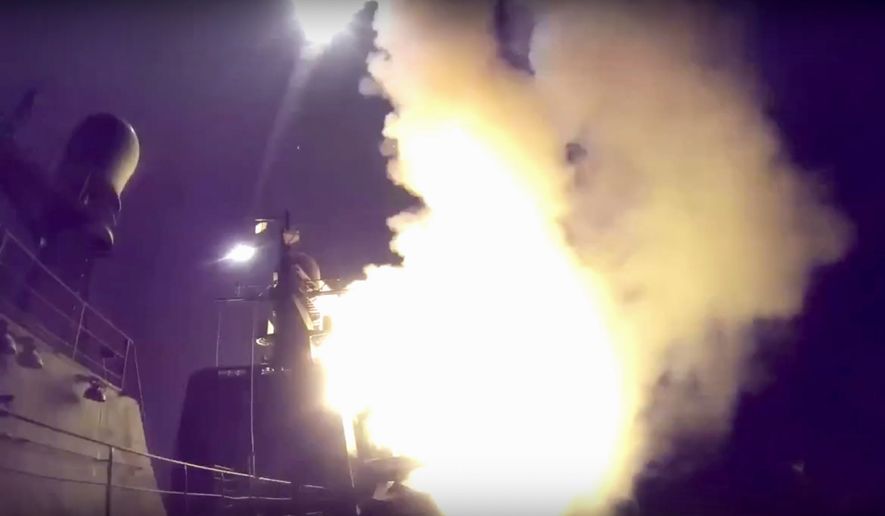Key lawmakers on the House and Senate intelligence committees have begun probing whether the CIA and other U.S. spy agencies failed to clearly predict the scope of Russia’s military incursion into Syria — an intervention of fighter jets, ground troops and dozens of cruise missiles fired across some 930 miles from warships in the Caspian Sea.
Top Democrats and Republicans on both committees, however, resisted the notion Thursday of opening a special investigation into potential U.S. intelligence failures surrounding Russia’s moves.
“Although we will continue to look into the timeliness and accuracy of intelligence assessments, I do not think we should rush to find fault with the intelligence community in its ability to discern exactly what is in [Russian President Vladimir Putin’s] head,” said Rep. Adam B. Schiff of California, the ranking Democrat on the House Permanent Select Committee on Intelligence.
Capitol Hill sources close to the committee’s Republican leaders in the House and Senate told The Washington Times that some people are frustrated that intelligence officials may have failed to accurately assess Russia’s war plans, but lawmakers are cautious about overpoliticizing the situation.
“No one’s going to confirm that there’s a formal investigation at this point,”one congressional source said.
“What’s going on is generally part of the regular oversight that both the Senate and House committees engage in,” another said.
A spokeswoman for Sen. Richard Burr, North Carolina Republican and chairman of the Senate Select Committee on Intelligence, said only that the committee is “engaged in constant, ongoing oversight of intelligence community activities.”
Brian P. Hale, a spokesman for the Office of the Director of National Intelligence, denied there was any failure on the intelligence community’s part.
He said in a Thursday evening statement to The Washington Times that officials have for years been tracking and reporting on Russia’s involvement in Syria for years, which he called “one of the most dynamic, complex security challenges … in recent memory.”
“In recent months, the Intelligence Community tracked and reported Moscow’s determination to play a more direct role in propping up Assad’s grip on power, including its deployment of offensive military assets to Syria. While these events unfolded quickly, the IC carried out its responsibilities with equal agility,” he said.
The exchange came after Reuters reported that senior lawmakers had begun examining the extent to which the intelligence community overlooked or misjudged critical warning signs about how aggressive Russia’s incursion would be.
In addition to launching long-range cruise missiles from the Caspian, officials say, the Russians have flown more than 140 fighter jet sorties over Syria during the past week and coordinated operations with the regime of Syrian President Bashar Assad and Iranian-backed ground forces in the war zone.
Officials in Moscow have said some 2,000 Russian ground troops have been deployed to protect a new air base in the Syrian port city of Latakia.
If the American spy community failed to predict such developments, it would mark the latest of several U.S. intelligence misses in recent years. As examples, Reuters pointed to Washington’s blind spots over Moscow’s takeover of Ukraine’s Crimea region last year and China’s rapid expansion of island-building activities in the South China Sea.
The news agency also cited current and former U.S. officials as saying that while spy agencies have sought to increase intelligence gathering on Russia since the crisis over Ukraine, they continue to struggle with inadequate resources because of the emphasis on counterterrorism in the Middle East and the Afghanistan-Pakistan region.
Mr. Schiff appeared eager to defend the spy agencies Thursday. “As Putin’s intention to deploy more military power to Syria became clearer in recent weeks, the Intelligence Community kept the [House] Committee apprised of those developments,” he said in a statement.
He also said it’s “true that few would have predicted that Putin would react to the weakening position of the Assad regime by sending in combat aircraft and augmenting its naval presence. An increase in Russia’s material support for the Assad regime seemed much more probable.”
“Putin notoriously keeps a tight counsel and employs a deliberate strategy of improvisation and unpredictability,” Mr. Schiff said. “We need to make sure that we appropriately prioritize so-called hard targets like Russia.”
The head of the House Foreign Affairs Committee, meanwhile, slammed the Obama administration’s handling of the situation.”
“Putin has taken more action in two weeks in Syria than Obama has in two years. The Russians are quickly undermining U.S. influence in the region and even violating NATO’s airspace by freely overflying Turkey,” said Rep. Edward R. Royce, California Republican. “All of this being planned and coordinated with Iran. U.S. partners in the region are dismayed. Our defense secretary is criticizing the Russian strategy, but where is ours? The American people, Congress and our allies are waiting. Brutalized Syrians are waiting.”
• Guy Taylor can be reached at gtaylor@washingtontimes.com.




Please read our comment policy before commenting.